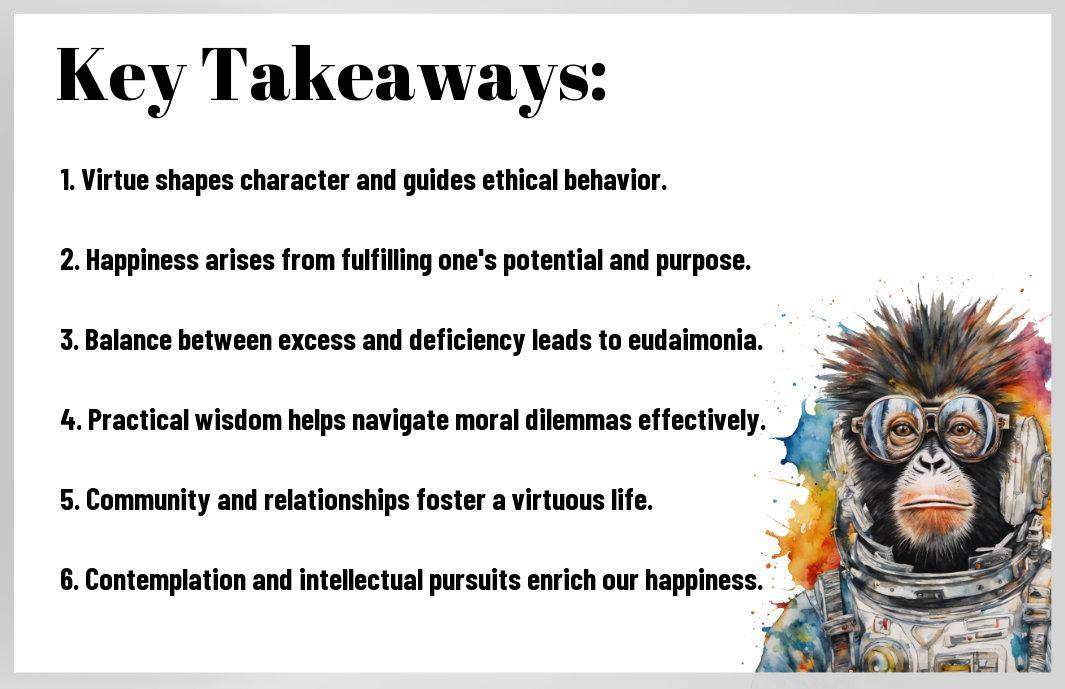
Newsletter Subscribe
Enter your email address below and subscribe to our newsletter

Enter your email address below and subscribe to our newsletter

Just like many of you, I’ve often pondered what it truly means to be happy. Aristotle, the great ancient philosopher, believed that virtue plays an vital role in our pursuit of happiness. As I look into his teachings, I want to share how embracing virtue can guide us towards a more fulfilling and joyful life. Together, we can explore the fascinating connection between living virtuously and experiencing genuine happiness in our everyday lives.


Your journey to happiness, according to Aristotle, begins with understanding virtue. It’s not just a lofty concept or moral ideal; it’s something that can shape the way we live our lives and how we pursue joy. Virtue is imperatively about striking a balance—finding the mean between excess and deficiency. This is what Aristotle called the “Golden Mean,” and it’s a key component of his ethical framework. Virtue is aligned with reason and is about cultivating good habits that contribute to your character and overall well-being.
With this understanding, let’s dive deeper into what virtue really entails. Virtue, in its essence, is a trait of character manifested in habitual action, which is good for both the individual and society. It’s about developing qualities such as courage, temperance, and wisdom. Virtue forms the basis of a well-rounded life, guiding you toward making choices that lead to true happiness. When you cultivate these qualities, you’re not just enhancing your own life but also positively impacting those around you.
Before we move on, it’s imperative to talk about the role of character in this discussion. Character is what informs our virtues; it is the collection of traits and qualities that define who you are. Your character influences how you react to situations and challenges in life, shaping your opportunities for happiness. In Aristotle’s view, cultivating a strong character through virtuous actions lays the foundation for a fulfilling life. It’s not just about knowing what is right but actively practicing those values in your everyday choices and behaviors.
Further, character acts as a compass, guiding you through life’s complexities and moral dilemmas. When faced with challenges, your virtues will steer you toward the right path, creating a sense of authenticity and integrity in your life. By nurturing your character through consistent virtuous actions, you build a strong, reliable foundation for happiness that endures even in tough times. After all, true happiness isn’t fleeting; it’s about who you become over time, all of which boils down to the virtues you choose to embody.
Assuming that virtue plays a significant role in achieving happiness, it’s necessary to explore how these two concepts intertwine in Aristotle’s philosophy. Aristotle believed that happiness, or eudaimonia as he called it, is the highest good and the ultimate end we all strive for. For him, leading a virtuous life is inherently tied to attaining this state of flourishing. Without virtue, he argued, happiness is merely a fleeting sensation rather than a lasting fulfillment. I find it fascinating that Aristotle emphasized moral character and ethical virtues, suggesting that living in accordance with our true nature leads to genuine happiness. In a way, it feels like a beautiful journey toward discovering our best selves.
Between the mundane aspects of daily life and the loftier pursuits of the mind, Aristotle provided a balanced view of happiness rooted in virtue. He believed that by practicing virtues such as courage, justice, and temperance, we actively cultivate our character. In this process, we develop not just our capacity for happiness, but also our ability to contribute to the well-being of others. Personally, I resonate with this idea that happiness is not just about self-gratification but also involves improving the world around us.
Happiness, according to Aristotle, isn’t simply a feeling; it’s a way of living that reflects our virtues and fulfills our potential. Aristotle describes it as an activity of the soul in accordance with virtue, suggesting that true happiness is realized through our actions and choices, not just through ephemeral pleasures. I’ve come to appreciate how this definition encourages me to reflect deeply on my own values and how they align with my pursuit of happiness.
Aristotle elaborates on the idea of happiness by asserting that it involves an ongoing process and is not a one-time achievement. Instead, it flourishes through the cultivation of virtues and intentional living. It makes me think about my daily decisions and how they can either contribute to or detract from a deeper sense of fulfillment. By aligning my life with what Aristotle calls the “golden mean” — seeking balance and moderation — I can create a more meaningful path toward my own happiness.
Despite the hustle and bustle of modern life, practicing virtue can become an enriching part of your daily routine. Aristotle believed that happiness stems from living in accordance with virtue, which means that each day presents an opportunity to cultivate habits that lead to a more fulfilling existence. By consciously making choices that reflect your moral values, you begin to align your actions with your beliefs, fostering a sense of inner harmony. Whether it’s through acts of kindness, being honest, or showing courage in challenging situations, embracing virtue becomes a pathway to happiness.
Across our lives, habits shape who we are, and cultivating good habits can significantly influence our journey toward happiness. I’ve found that by incorporating small, consistent actions into my daily routine, I can better align my life with virtuous living. This might mean dedicating a few minutes each day to express gratitude, helping someone when they need it, or simply reflecting on my choices and their impact on others. As these actions become part of my daily habits, I notice a growing sense of fulfillment and joy in my life.
To truly thrive in practicing virtue, I believe that a supportive community plays a pivotal role. Being surrounded by like-minded individuals encourages me to stay committed to my virtuous pursuits. It’s easy to lose sight of what matters when you’re going at it alone, but sharing experiences and insights with others helps me stay grounded. Engaging with a community fosters accountability, inspires growth, and reinforces the importance of virtue in our lives.
Daily interactions with your community can also offer opportunities to practice and witness virtue in action. For instance, volunteering or participating in local events can connect you with others who share similar values, creating a strong sense of belonging. I’ve seen how these connections enhance my desire to grow as a person and actively contribute to the well-being of others. Ultimately, your community can serve as a source of support and inspiration, making the journey toward a virtuous life even more enriching and joyful.
All of us strive for a sense of balance in our lives, and to Aristotle, this balance is achieved through the concept of the Golden Mean. He believed that virtue lies between excess and deficiency, meaning that true happiness cannot be found in extremes but rather in moderation. By embracing this philosophy, we can cultivate our character and make choices that lead us closer to a fulfilled and joyful existence. The Golden Mean is not a one-size-fits-all solution; it requires a personal assessment of our habits and behaviors to find that sweet spot where we can thrive.
By engaging in self-reflection, we can identify areas in our lives that may need adjustment. Whether it’s our approach to work, leisure, or even relationships, I encourage you to ask yourself if you tend to lean towards excess or deficiency. For instance, if you find yourself overindulging in work, causing stress and burnout, it might be time to seek a healthier balance by prioritizing rest or leisure activities. On the flip side, if you constantly avoid responsibilities, seeking pleasure and distractions, recognize that stepping up to your commitments can lead to a more stable sense of well-being. It’s all about finding that middle ground where true happiness can flourish.
Finding the right balance can be illustrated through everyday examples of the Golden Mean. Consider courage, which exists between recklessness and cowardice. If you’re overly daring, you might disregard your safety, while excessive fear might prevent you from taking necessary risks in life. Similarly, generosity can be found between prodigality (giving too much) and stinginess (giving too little). These examples illustrate how virtues serve as a guide in navigating life’s complexities by helping us see where we might need to recalibrate our actions.
In addition to these straightforward examples, you might find the Golden Mean manifested in your daily choices and interactions. For instance, consider your social life—are you overly social to the point of neglecting your own needs, or too withdrawn, missing out on valuable connections? By observing your behaviors in various areas, you can begin to strike a healthier balance. Ultimately, embodying the Golden Mean is a joyful journey of discovering how to engage with the world around you while nurturing your own happiness.
Not everyone finds it easy to embody virtuous living, and I completely understand why. Life presents so many distractions and challenges that can pull us away from our ideals. Between cultural expectations and the demands of everyday life, maintaining a commitment to virtue can feel like a daunting task. You might find yourself battling with inner conflicts, personal desires, and societal pressures that make it hard to align your actions with your values. It’s important to recognize that these challenges are common, and it’s okay to face them head-on.
Before you can embrace a virtuous life, you need to identify the specific obstacles that hinder you. Are there habits you’ve formed that don’t align with your values, or perhaps relationships that pressure you into making unwise choices? By taking a moment to reflect on these areas, you can start strategizing how to overcome them. I’ve found that being proactive in addressing obstacles leads to a more genuine pursuit of virtue. Establishing small goals and celebrating the little victories can make a significant difference in forging a path toward a more virtuous life.
Across the landscape of modern living, there are relentless pressures that can affect your ability to live virtuously. Whether it’s the pressure to succeed at work, to maintain social status, or to adhere to ever-changing social norms, these influences can often lead us away from our true values. I’m sure we’ve all felt the push to conform to popular opinions, even when they don’t resonate with who we are. It could feel like a constant balancing act between upholding virtue and meeting external expectations.
Pressures in our fast-paced world can make it feel like there is no room for virtue. Social media bombards us with ideals that might not reflect our true selves, often leading to comparisons that can be discouraging. When I navigate through these pressures, I try to focus on what truly matters to me, filtering out the noise. Staying grounded in my values and practicing mindfulness has been necessary for me; it encourages me to embrace my authentic self in a world that often prioritizes superficial success. By doing this, I find it easier to resist temptations that lead away from virtue, helping me stay on a path that aligns with my happiness.

Now, when I think about personal fulfillment, it often hits me that virtue plays a transformative role in how I view myself and my life. By striving to live virtuously, I find that my daily choices are imbued with more meaning and purpose. I feel deeply satisfied when I let honesty guide my actions or when I practice kindness, allowing these virtues to shape my identity. This sense of alignment with my values fosters a profound happiness that is durable; it doesn’t waver based on external circumstances.
Beside personal benefits, the pursuit of virtue significantly impacts my contributions to society. When I embody virtues like compassion and justice, I notice a ripple effect that not only enhances my happiness but also uplifts those around me. I am more inclined to engage with my community and support others, creating a sense of connectivity that I find deeply rewarding. This interconnectedness reinforces my happiness as I take part in something larger than myself, leading to a shared sense of fulfillment.
But the joy that comes from contributing to society is even more profound than I initially realized. Each act of virtue, whether big or small, contributes to a collective well-being that can elevate an entire community. When I volunteer my time or offer support to someone in need, I experience a rush of happiness that reinforces my values. In turn, these experiences not only enhance my own life but also inspire others to act virtuously, creating a cycle of positivity that radiates outward. It’s a reminder that our virtuous actions indeed have the power to shape both our lives and the world around us.
On the whole, I find Aristotle’s perspective on virtue and happiness profoundly enlightening. He suggests that true happiness isn’t just a result of fleeting pleasures or external achievements, but rather the cultivation of virtuous habits and moral character. By embracing virtues like courage, temperance, and wisdom, we develop a sense of purpose that genuinely enriches our lives. I believe that when you strive to be virtuous, you begin to align your actions with your values, leading to a more fulfilling and happy existence.
If you’re curious about how to apply these ideas in your own life, exploring the connection between virtue and happiness can be a rewarding journey. I encourage you to research deeper into Aristotle’s philosophy and see how it resonates with your experiences. You can start by checking out discussions like How does virtue as defined by Aristotle lead to happiness. Ultimately, I believe that by nurturing our virtues, we can unlock a richer, more satisfying life, filled with genuine happiness.
A: For Aristotle, virtue refers to a character trait or quality that promotes moral excellence. He distinguishes between intellectual virtues, which are related to the mind and involve knowledge and wisdom, and moral virtues, which pertain to emotions and actions. Virtue is about finding the mean between excess and deficiency in behavior, contributing to an individual’s overall well-being and happiness.
A: Aristotle posits that happiness, or eudaimonia, is the highest good for humans and is achieved through living a life of virtue. He argues that true happiness is not found in fleeting pleasures but in the fulfillment that comes from acting according to virtue. In essence, practicing virtue leads to a stable and fulfilling life, bringing individuals closer to their true potential.
A: Yes, Aristotle categorizes virtues into two main types: moral virtues, which involve the right disposition to feel and act, such as courage and temperance, and intellectual virtues, which involve the cultivation of the intellect, such as wisdom and understanding. Both types are necessary for achieving a balanced and happy life.
A: Cultivating virtue involves practicing good habits consistently over time. This may include engaging in self-reflection, seeking knowledge, and striving for a balanced approach in various situations. Surrounding oneself with virtuous people can also provide support and inspiration in the pursuit of a virtuous life.
A: Aristotle argues that virtue is not innate but can be developed through practice and experience. While individuals may have natural tendencies, they must actively choose to cultivate virtues through their actions and decisions, reinforcing these traits until they become habitual.
A: Aristotle suggests that true happiness cannot exist without virtue. While one might experience temporary pleasures or superficial happiness through material wealth or status, these do not constitute genuine happiness. Only a life guided by virtue can lead to lasting fulfillment and authentic joy.
A: Aristotle’s view of virtue emphasizes the importance of moral character and ethical living as a pathway to happiness, contrasting with many modern views that often prioritize personal satisfaction and emotional fulfillment. While contemporary perspectives may focus on subjective experiences of happiness, Aristotle advocates for a deeper, more integrated approach that values virtue as important for achieving long-term happiness.